
September 13


1814 Key pens Star-Spangled Banner:
On this day in 1814, Francis Scott Key pens a poem which is later set to music and in 1931 becomes America's national anthem, "The Star-Spangled Banner." The poem, originally titled "The Defence of Fort McHenry," was written after Key witnessed the Maryland fort being bombarded by the British during the War of 1812. Key was inspired by the sight of a lone U.S. flag still flying over Fort McHenry at daybreak, as reflected in the now-famous words of the "Star-Spangled Banner": "And the rocket's red glare, the bombs bursting in air, Gave proof through the night that our flag was still there." [For further details, Click Here]
1860 Birth: John Joseph Pershing: in Laclede, Missouri.
After a period spent as a schoolteacher . . . . went to West Point. Although not an especially outstanding student (graduating 30th out of a class of 77) he was noted early on by officers for his leadership qualities. He was elected president of the class of 1886, and each year held the highest rank in the Cadet Battalion. Pershing commanded the Corps of Cadets when it crossed the Hudson from West Point to Garrison to stand and present arms while the funeral train of Ulysses S. Grant passed by.
Pershing took up duty as Professor of Military Science and Tactics at the University of Nebraska in September 1891, a post he held for four years.
During his varied military career Pershing performed frontier duty against the Sioux and Apache from 1886-90, where he won the Silver Star Medal; fought in the Cuban War in 1898; in the Philippines in 1903, cleaning up the Moro insurrectionists; and with the Japanese army during the Russo-Japanese war of 1904-5, as an observer. He was promoted to Brigadier General in 1906. This was followed by the Mexican Punitive Expedition (of 10,000 men) to capture Pancho Villa in Mexico in 1915.
Following the U.S. declaration of war against Germany in 1917, Pershing - now a General - was appointed Commander-in-Chief of the American Expeditionary Force (AEF). At the time of his appointment there was no expeditionary force available as such; the regular army comprised 25,000 men at most, and no effective reserves. Pershing needed to recruit an organised army and get it into the field; 500,000 men. Eventually, the National Army grew--over the period of a year and a half--to nearly 3 million men. Pershing personally led the successful Meuse-Argonne offensive of 1918.
In 1921 Pershing became U.S. Army Chief of Staff. He retired from active duty in 1924 at the age of 64, having been awarded the title 'General of the Armies' by Congress, a post previously held only by George Washington (and only then retrospectively awarded in 1976). His autobiography, My Experience of War, was published in 1931, winning the Pulitzer Prize for history in 1932.
John Joseph Pershing died on 15 July 1948 in Washington, D.C.
1863 Various:
Birth: Admiral Franz von Hipper:
Prior to the First World War Hipper led the High Seas Fleet Scouting Forces from 1912 onwards. With war declared, Hipper often lurked in the dangerous North Sea with his Battlecruiser Squadron, and met with success during raids in the early stages of the war.
Following the raid at Scarborough in December 1914, at which the Royal Navy was, at least so far as the press and popular opinion were concerned, caught napping, a determined effort was made to find and destroy Hipper's squadron. Having decided to try and repeat his earlier success at Scarborough, Hipper was in the process of sailing to Britain in January 1915 when, following the interception of radio traffic, the British, led by Admiral Beatty, intercepted him at the Battle of Dogger Bank.
By a combination of luck and skill Hipper escaped, and next came to prominence when his squadron opened the hostilities at the Battle of Jutland, of 31 May-1 June 1916, where he succeeded in inflicting severe damage on Beatty's squadron and, towards the close of the battle, saved Admiral Scheer's fleet by a remarkably bold (and apparently suicidal) charge towards Jellicoe's battleships.
Appointed Scheer's successor as commander of the High Seas Fleet in August 1918 (Scheer himself was made head of the new German Navy Supreme Command), his final gamble, planned for October that year - pitting the High Seas Fleet against the British Grand Fleet, was abandoned following the naval mutiny at Kiel, saving Hipper from certain defeat had he succeeded in sailing to meet the British. With the war lost Hipper oversaw the surrender of the High Fleet to the British; he retired from active service in December 1918. Admiral Franz von Hipper died in 1932.
Birth: Arthur Henderson: British politician, socialist, disarmament worker; Nobel 1934.
1899 Birth: Corneliu Zelea Codreanu: the charismatic leader of the Romanian ultra-Nationalist and strongly anti-Semitic movement in the period between the two World Wars, The Iron Guard (Garda de Fier) or The Legion of the Archangel Michael (also known as the Legionaries, The Legionary Movement or, although never officially, as The Green Shirts). References to him as just Corneliu Codreanu do exist, and Zelea is never used as the family name it is: all entries for Codreanu cite it as if it were a middle name. The Legionaries traditionally referred to Codreanu as Capitanul ("The Captain"), and he held absolute authority over the organization until his death. Noua Dreapt, which claims to be successor of the pre-war Iron Guard, depicts him as a spiritual figure and Romanian Orthodox saint.
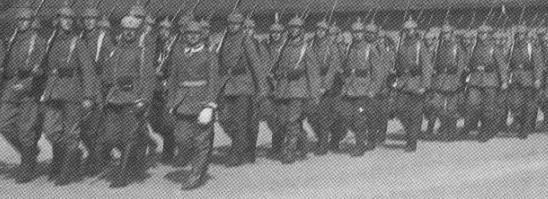
1914 List Regiment (Sep 1-Oct 7): Infantry Recuit Adolf Hitler's regiment begins a short but intensive basic training program, which is held in the premises of a large public school on the Elizabeth Platz in Munich. Hitler receives the first uniform of his life; basic greenish-grey with an "RIR 16" sown in red unto the epaulettes and a red stripe down the side of the trousers. The trousers are tucked into new leather boots, topped by a thick leather belt around the waist of the uniform jacket. [For further details, Click here.]
1914 World War I: Various:
South-West Africa: South African troops open hostilities with an assault on the Ramansdrift police station.
Irish nationalist seeks German support:

In Washington, D.C., on September 13, 1914, the former British diplomat Sir Roger Casement secretly meets with Franz von Papen, the German military attache, to seek Germany's support in the effort to win independence from British rule for Ireland.
Born in Dublin in 1864, Casement earned international acclaim for his work as a British consul in Mozambique, Angola, the Congo and Brazil. He was rewarded with a knighthood in 1911. That same year, he retired from diplomatic service, citing ill health. Returning to Dublin, Casement helped found the Irish National Volunteers in 1913 and his trip to the United States in the summer of 1914 was aimed at garnering support for the nascent organization.
In his meeting with Papen-who in 1932 would briefly serve as chancellor of Germany before becoming vice chancellor under Adolf Hitler the following year-Casement suggested that an Irish Brigade be formed to fight alongside the Germans against Britain and the other Allies in World War I. Casement continued his campaign for German support with a trip to Germany soon after; by the time he left, he had persuaded the German government to issue a declaration stating that "Should the fortunes of this great war, that was not of Germany's seeking, ever bring in its course German troops to the shores of Ireland, they would land there, not as an army of invaders to pillage and destroy, but as the forces of a government that is inspired by good-will towards a country and a people for whom Germany desires only national prosperity and national freedom."
Casement failed to secure Germany's direct support, however, in the form of sending troops to Ireland. He also failed to recruit any German military officers to assist in the planned Easter Rising, scheduled to take place on April 24, 1916. He consequently aimed to discourage his fellow organizers from going ahead with the uprising, on the grounds that they were not sufficiently prepared. On his return to Ireland from Berlin, however, Casement was arrested by the British and tried in London for treason. The Easter Rising went ahead without him, and was easily crushed by police and government forces. Casement was executed by hanging on August 3, 1916; his body was returned to Ireland years later, where he was given a state funeral and remembered as a hero of Irish nationalism.

1915 World War I: Gefreiter Adolf Hitler's 16 Reserve Infantry Regiment [List Regiment] occupy a position, at Fromelles (pictured above in a drawing by Hitler), which is on a level field with water channels, willow trees and willow stalks, in the distance towards the enemy lines lie an insignificant wood with barbed wire entanglements. Under the direction of their defense-minded commander, Lieutenant General Gustav Scanzoni von Lichtenfels, the regiment works ceaselessly day and night to further fortify their position at Fromelles while fighting off repeated assaults by the enemy. [For further details, Click here.]
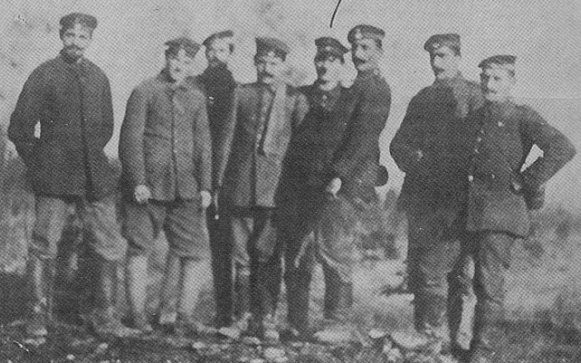
Hitler and his fellow dispatch runners
1916 World War I: Gefreiter Adolf Hitler endures trench warfare in Flanders (Artois) with 3 Company, 16 Reserve Infantry Regiment [List Regiment]. [For further details, Click here.]
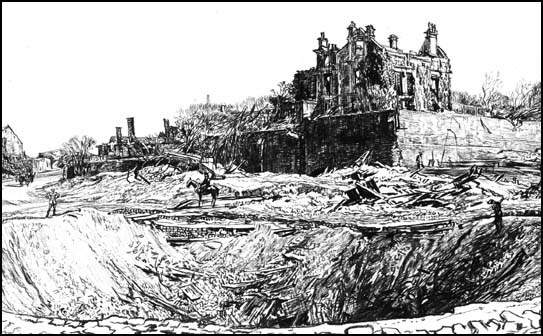
1917 World War I (September 11-30): The List Regiment is put on light duty, guarding a camp near Mulhouse in Alsace, the only section of the front on German soil. During this slow time, not only will Hitler and his comrades get a well-deserved respite from the rigors of trench warfare, but the heavily censored news from the Front seems to be improving as well. The news of the collapse of the Russian Front and the further defeats of Italian arms is, however, tempered by the news that German munitions workers have gone on strike. This mix of events give an impression that the war on the Front is going well, but being undermined by defeatism on the home front. [For further details, Click here.]
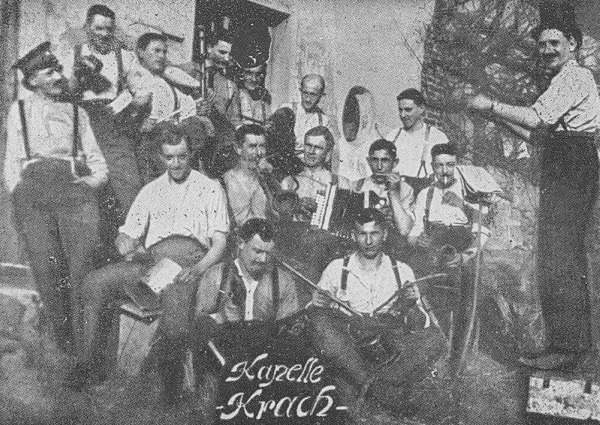
1918 World War I (August 21-September 27): Gefreiter Adolf Hitler attends a signals training course in Nuremberg. [For further details, Click here.]
1934: Poland denounces the Minorities Agreement, which had been set up at Versailles and guaranteed by the Covenant of the League of Nations. Hitler chooses not to protest Poland's denunciation even though German interests are directly involved. (History.com)
1936 Press Reaction to Hitler's September 12 Speech:
There was no expression of a wish to acquire these resources (Russian) and there was distinctly no threat. Yet when the cheers that greeted this passage had died away one was conscious that a thought had been cast into the pool of German mentality and that the ripples created by it might spread far indeed . . . . To the shop stewards and factory leaders there assembled Hitler spoke extemporaneously and at length, quite simply; his voice rising at times to passionate earnestness. (New York Times)
1937 Antisemitism: Poland: An Anti-Jewish month is proclaimed by Polish anti-Semitic groups.
1938 Sudeten Crisis: Czechoslovakian President Benes declares martial law in the Sudetenland:
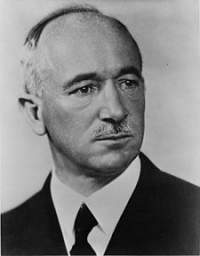
After Germany had bullied and disenfranchised its Jewish population, withdrawn from the League of Nations and launched invasive occupations of the Rhineland (1936), Austria and the Sudetenland (1938) and Czechoslovakia (1939), the British and their allies finally made a stand.
1939 World War II: Various:
Poland: 60,000 Polish troops surrender in the Radom pocket.
All Polish forces were ordered to fall back and regroup in Eastern Poland for a last stand. All hope was pinned upon a major French and British offensive in the west to relieve the pressure. However, despite assurances from Marshal Maurice Gamelin that the French Army was fully engaged in combat, all military action on the western front was ended on 13 September, when French troops were ordered to fall back behind the security of the Maginot line.
USA: President Roosevelt calls on Congress to revise Neutrality Law.
1940 World War II: Various:
Italy invades Egypt:
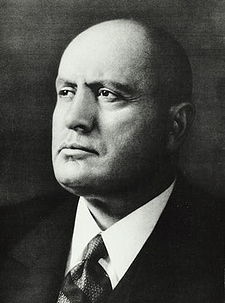
On this day in 1940, Mussolini's forces finally cross the Libyan border into Egypt, achieving what the Duce calls the "glory" Italy had sought for three centuries.
Italy had occupied Libya since 1912, a purely economic "expansion." In 1935, Mussolini began sending tens of thousands of Italians to Libya, mostly farmers and other rural workers, in part to relieve overpopulation concerns. So by the time of the outbreak of the Second World War, Italy had enjoyed a long-term presence in North Africa, and Mussolini began dreaming of expanding that presence—always with an eye toward the same territories the old "Roman Empire" had counted among its conquests. Chief among these was Egypt.
But sitting in Egypt were British troops, which, under a 1936 treaty, were garrisoned there to protect the Suez Canal and Royal Navy bases at Alexandria and Port Said. Hitler had offered to aid Mussolini in his invasion, to send German troops to help fend off a British counterattack. But Mussolini had been rebuffed when he had offered Italian assistance during the Battle of Britain, so he now insisted that as a matter of national pride, Italy would have to create a Mediterranean sphere of influence on its own, or risk becoming a "junior" partner of Germany's.
As the Blitz commenced, and the land invasion of Britain by Germany was "imminent" (or so the Duce thought), Mussolini believed the British troops in Egypt were particularly vulnerable, and so announced to his generals his plans to make his move into Egypt. Gen. Rodolfo Graziani, the brutal governor of Ethiopia, another Italian colony, disagreed, believing that Italy's Libya forces were not strong enough to wage an offensive across the desert. Graziani also reminded Mussolini that Italian claims of air superiority in the Mediterranean were nothing more than propaganda.
But Mussolini, a true dictator, ignored these protestations and ordered Graziani into Egypt—a decision that would disprove the adage that war is too important to leave to the generals. (History.com)
German bombs damage Buckingham Palace:
In the Queen Mother's own words:
It all happened so quickly that we had only time to look foolishly at each other when the scream hurtled past us and exploded with a tremendous crash in the quadrangle," she wrote. While her "knees trembled a little bit", she was "so pleased with the behaviour of our servants", some of whom were injured as one bomb crashed through a glass roof and another pulverised the palace chapel.
Hours later, after lunching in their air-raid shelter, she and the King were visiting West Ham in London's East End. She wrote: "I felt as if I was walking in a dead city . . . . all the houses evacuated, and yet through the broken windows one saw all the poor little possessions, photographs, beds, just as they were left." . . . . The bombing of the palace led the Queen Mother to utter one of her most famous comments: "I am glad we have been bombed. Now we can look the East End in the eye."
In her letter, written after a tiring day of drama, she confides: "It does affect me, seeing this terrible and senseless destruction; I think that really I mind it much more than being bombed myself. The people are marvellous, and full of fight. One could not imagine that life could become so terrible. "We must win in the end."
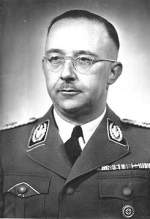
Holocaust: Himmler meets in Berlin with Viktor Brack: section chief in Hitler's Chancellery responsible for running the "euthanasia" program. After the war, Brack will tell American interrogators that the physical destruction of the Jews is already an "open secret" in high party circles, as early as 1940, although he had "in no case heard anything officially." (THP)
1941 Various:
Barbarossa<'strong>: Russian General Zhukov is sent to oversee defense of Leningrad: He puts the citizens to work creating multiple defensive lines around the city. (Clark II)
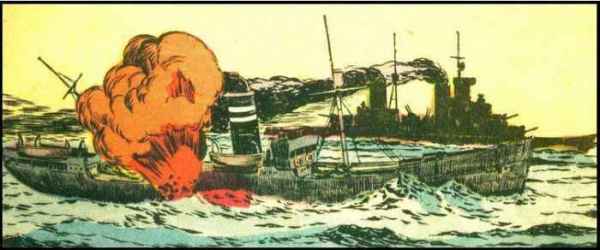
From the Diary of Rear Admiral Giichi Nakahara:
During this week Leningrad was completely besieged by German troops and its fall has come to be a question of time. During this week two American ships were sunk and one US destroyer was attacked by a German submarine; until this time the US has been very calm, but these events have made the President of the United States issue an order to attack German naval ships and airplanes in the patrol area of the US. Germany has declared it will attack American ships to be found in the German blockaded district. And then both countries came to show fighting conditions in special zones. Japan will remain aloof in regard to the declaration of the United States: Lord only knows! Changes and transference of the fleets were finished on 10 September, it will soon be issued. (Dillon)
[See: Countdown to Infamy: Pearl Harbor.]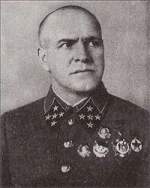
The darkest days for Zhukov were after 22 June 1941 with the invasion of the Soviet Union, Operation Barbarossa, by Hitler's European anti-communist hordes as he tried to plug huge breakthrough gaps in the frontline and flagging morale as hundreds of thousands of Russian servicemen were killed or captured. STAVKA, Soviet High Command, had a meeting in Moscow, 29 July, on how to stem this seemingly invincible advance. General Zhukov urged withdraw from Kiev and stabilize the whole frontline. Stalin angrily rejected this proposal and instantly accepted Zhukov's resignation and the ailing Marshal Shaposnikov became chief of the Russian general staff, again. Zhukov was sent to command a reserve northern frontline battlezone and his first major task allotted by Stalin was to stabilize the Leningrad Front in September 1941. He replaced the existing commander, and his staff, restoring confidence, imposing discipline and planned for the defence of the starving besieged city, street by street.
1943 World War II: Various:
China:General Chiang Kai-shek is elected President of the Chinese Republic by the Central Executive committee and also confirmed as Commander-in-Chief of the Chinese army. (THP)
Italy: Beginning of a German counterattack against the US Fifth Army's bridgehead at Salerno:
In September 1943 Allied hopes were high. The Italians separated into two camps, pro-Allied and pro-German factions. The Allies landed Americans at Salerno and British at Taranto on September 9, and by September 26 had built a force of 189,000 men and 30,000 vehicles. Blown bridges and blocked roads hampered the initial assault.
1944 World War II:Various:
Churchill to War Cabinet:

The (Second Quebec) Conference has opened in a blaze of friendship. The staffs are in almost complete agreement already. There is to be no weakening of Alexander's army till Kesselring has bolted beyond the Alps or been destroyed . . . . The idea of our going to Vienna, if the war lasts long enough and if other people do not get there first, is fully accepted here.
Churchill to Generals Wilson and Alexander:
Everything has opened here very well so far as your affairs are concerned . . . . Pray therefore address yourselves to this greatly improved situation in a spirit of audacious enterprise. The Americans talk without any hesitation of our pushing on to Vienna, if the war lasts long enough. I m greatly relieved at the reception all our ideas have met here. We must turn these advantages to the best account.
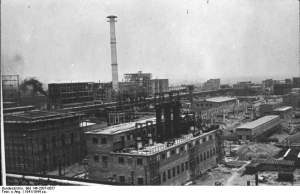
Auschwitz: American B-24s attacking the IG Farben plant at Monowitz accidentally drop several bombs inside the main camp at Auschwitz, destroying a barracks, killing 15 SS men and injuring 28. A cluster of bombs is also mistakenly dropped farther west at Birkenau, damaging the railroad but missing the crematoria, which would have slowed down the killing. (THP)
Poland: The Red Army captures the Warsaw suburb of Praha on the east bank of the Vistula.
Romania: An armistice is signed in Moscow between Romania and the Soviets, three weeks after it had been falsely announced by the King. It is essentially an unconditional capitulation and puts Romania entirely in the hands of the Soviets.
1945 Vietnam: British troops arrive to disarm the Japanese:
In accordance with the Potsdam Agreements at the end of WWII, 5,000 British troops of the 20th Indian Division, commanded by Gen. Douglas Gracey, arrive in southern Indochina to disarm the defeated Japanese forces. In August, Ho Chi Minh and the Viet Minh had seized power in Hanoi and proclaimed the Democratic Republic of Vietnam and independence from French colonial rule. However, Gracey, who detested the Viet Minh, rearmed some 1,400 French soldiers who had been imprisoned by the Japanese. This effectively was the first step in the re-establishment of French colonial rule and set the stage for the conflict between the French and the Viet Minh that led to a bloody nine-year war which would not end until the Viet Minh inflicted a humiliating defeat on the French at the Battle of Dien Bien Phu in 1954. (History.com)
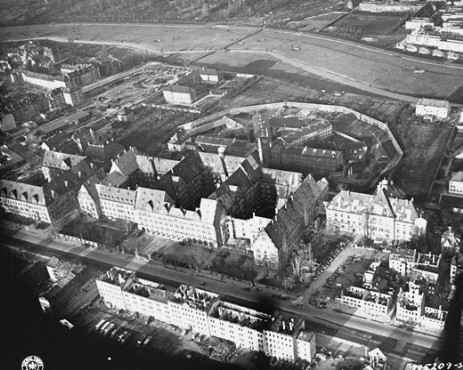
1946 Nuremberg Tribunal: The justices meet to discuss verdicts in the Major War Criminals Trial. (See: 30 September 1946)
1947: FBI Director J. Edgar Hoover writes a letter to the director of intelligence for the US Army, Lt. General Stephen J. Chamberlain, advising him that no classified technical information should be provided to the German scientists of Operation Paperclip. Chamberlain replies by pointing out that this is an absurd recommendation as it is the Germans themselves who have been developing the information. He informs Hoover, a fanatical anti-Communist, that the Germans are staunch allies in the battle against the Reds, and asks the Director to provide visas to the scientists. Hoover agrees, thus allowing the Germans to become legal residents in the US. (Piszkiewicz)
[See: Wunderwaffen: Hitler's Deception and the History of Rocketry.]1955 Germany: After talks between the Soviet Union and West Germany, the two sides agree to establish diplomatic relations.

1959: Luna 2 becomes the first man-made object to hit the Moon.
Edited by Levi Bookin (Copy editor)
levi.bookin@gmail.com



Click to join 3rdReichStudies



Disclaimer: This site includes diverse and controversial materials--such as excerpts from the writings of racists and anti-Semites--so that its readers can learn the nature and extent of hate and anti-Semitic discourse. It is our sincere belief that only the informed citizen can prevail over the ignorance of Racialist "thought." Far from approving these writings, this site condemns racism in all of its forms and manifestations.
Fair Use Notice: This site may contain copyrighted material the use of which has not always been specifically authorized by the copyright owner. We are making such material available in our efforts to advance understanding of historical, political, human rights, economic, democracy, scientific, environmental, and social justice issues, etc. We believe this constitutes a "fair use" of any such copyrighted material as provided for in section 107 of the US Copyright Law. In accordance with Title 17 U.S.C. Section 107, the material on this site is distributed without profit to those who have expressed a prior interest in receiving the included information for research and educational purposes. If you wish to use copyrighted material from this site for purposes of your own that go beyond 'fair use', you must obtain permission from the copyright owner.
Please Note: The list-owner and moderators of 3rdReichStudies are not responsible for, and do not necessarily approve of, the random ads placed on our pages by our web server. They are, unfortunately, the price one pays for a 'free' website.